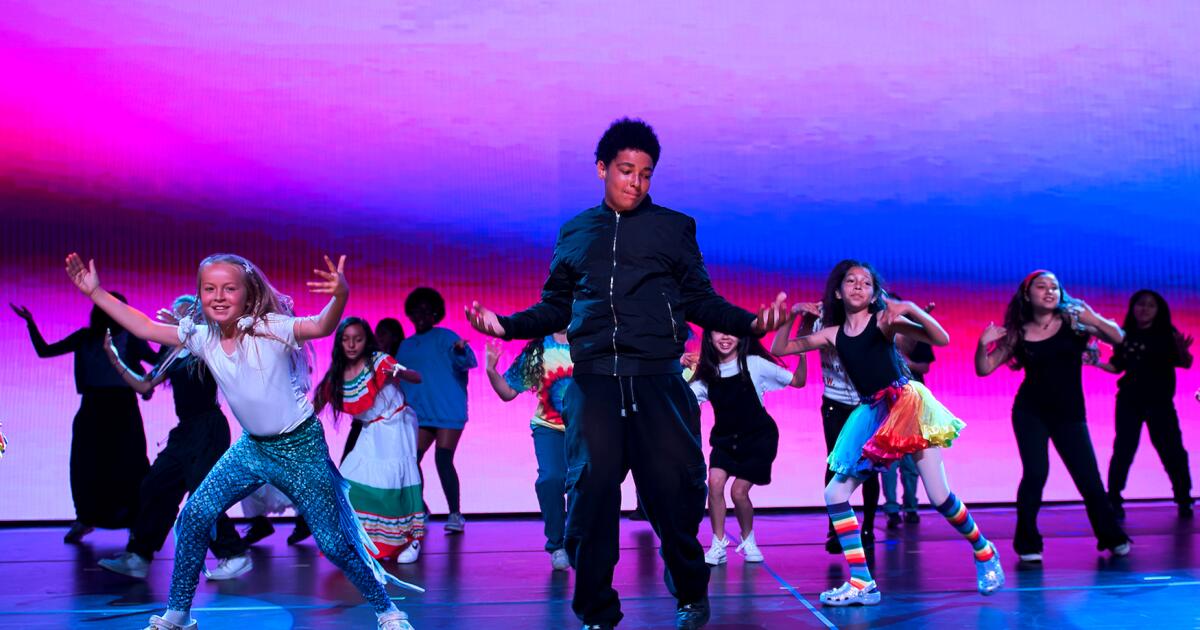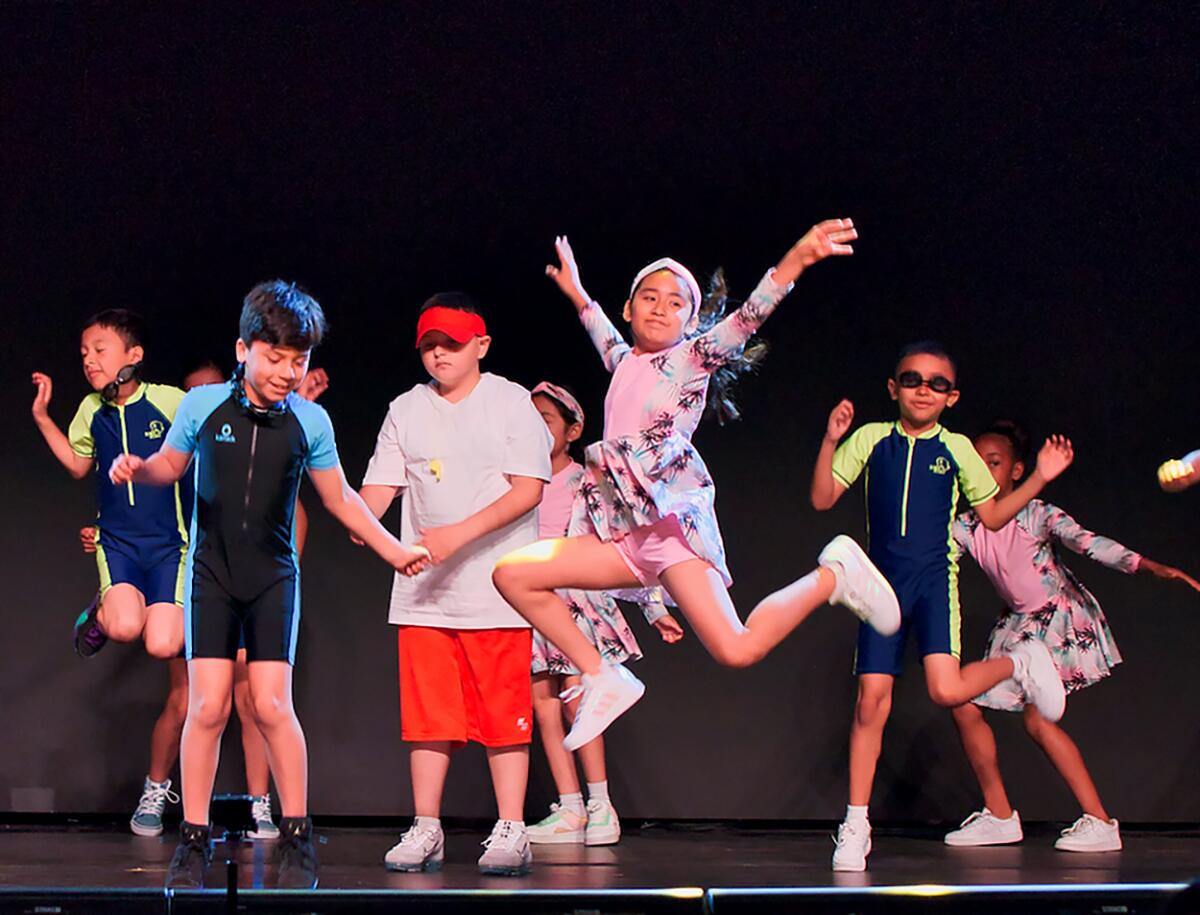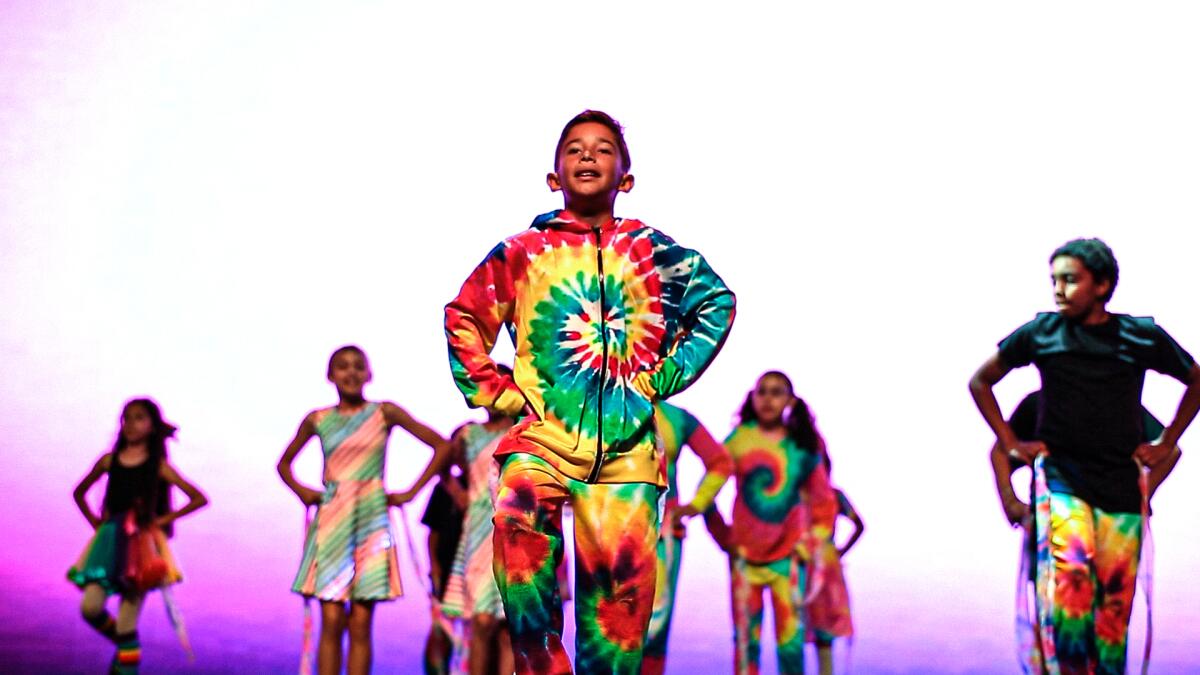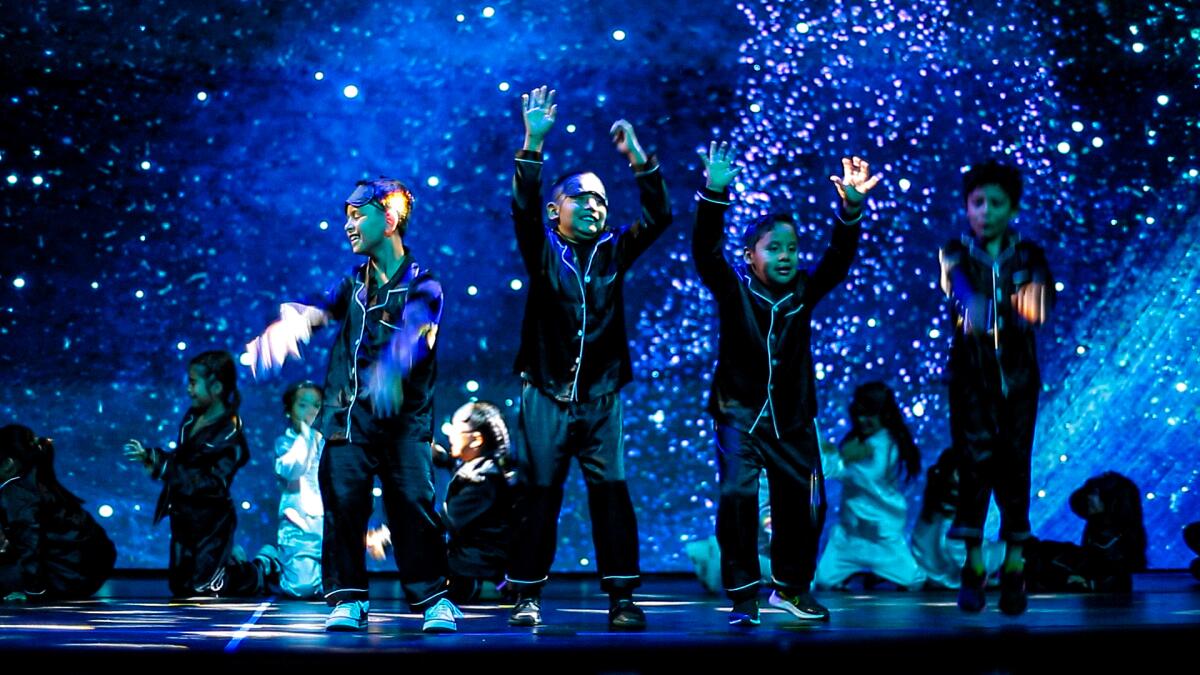Entertainment
25 years after 13-year-old dancer's death, her legacy lives on at L.A. charter schools

The Angelus Temple megachurch in Echo Park was the unlikely venue (and largest to date) for the Gabriella Charter Schools’ year-end dance recitals. Friends and family packed the 5,300-seat, three-story theater for two performances on a Saturday in June, which transported them from California’s redwood forests and Central Valley farms to the schools’ home of Los Angeles.
Sixth grader Annabelle Soriano took the stage as a voice-over in English and Spanish told the story — inspired by José Cruz González’s play “Two Donuts” — of a Guatemalan American girl who doesn’t see the beauty in her L.A. neighborhood. So, in her dreams, she embarks on an adventure through the Golden State in search of meaning. Students explore California through classic dance styles including tap, hip-hop and ballet mixed with moves popularized on TikTok and by the video game “Fortnite.”
Audiences lined Glendale Boulevard hours before the two performances. Gabriella Charter Schools Executive Director Rhonda Baldenegro said this is the norm for the schools’ annual recital — even though it’s only their second in-person performance since the COVID-19 pandemic.
Parents made costumes for each campus’ annual recital, including cactus sweatsuits for the third-grade “Joshua Tree” performance.
(Heather Seybolt)
The event’s popularity is a testament to Liza Bercovici’s decades-long commitment to dance education. Bercovici, a former attorney, founded an after-school dance program for low-income communities in 1999 in honor of her 13-year-old daughter, Gabriella Axelrad, who was killed that year by a distracted driver while bicycling during a family vacation. Gabriella was a dancer and dreamed of becoming a teacher. In 2005, the program grew into a charter school for students from kindergarten through eighth grade. The Echo Park campus that is now its home opened in 2009 and spawned a second location in South L.A. in 2017. About 400 students are enrolled at each school.
Twenty-five years after Gabriella’s death, her legacy lives on.
“We serve a pretty impacted population and any experience that can be offered them that enhances their lives, to me, is just really, really important,” Bercovici said. “We as an organization have made this commitment to provide arts and dance at a very high level and a very frequent level, and that’s very atypical.”
Baldenegro said GCS is one of the few public schools in the country to teach dance as a part of the curriculum multiple days a week. For many of GCS’ low-income students, it’s their sole opportunity for formal dance training.
Even after their big year-end recital, as summer vacation loomed, the kids at GCS kept dancing. For five students, the dancing will continue through the summer at the Theatrical Education Group’s Summer Arts Conservatory at Los Angeles County High School for the Arts. While enrollment costs more than $1,200, GCS students received full-ride scholarships.
GCS dance instructor Antavius Ellison was the catalyst in connecting the school and the program.

The Gabriella Charter Schools’ “Cali Dreams” recital, which included the third grade’s “Beach” routine, depicted different areas of the state.
(Emann Mallorca)
“The more I’m able to introduce [students] into those spaces now lets me feel like, ‘Hey, you’re doing your job. You didn’t have this growing up and now you’re able to pay it forward [in] a very hopeful way,’” said Ellison, a professional dancer who’s appeared in music videos for SZA and Hozier. “I feel like that’s one of my purposes for being at GCS right now. … I take it as a sign from God that you are doing just what you need to do.”
One of the conservatory scholarship recipients is rising eighth grader Madison Pinon, whom Ellison personally chose for the scholarship. He calls her his “little assistant/mentee.”
“As soon as she found out, I’ve never seen that smile,” Madison’s mother, Berlin Pinon, said. “[It was] ear to ear that whole weekend.”
The young dancer joined GCS in fifth grade. She hadn’t taken classes since she was 8 years old. As her dance skills progressed, Madison began assisting Ellison in leading classes for younger students at the Echo Park campus.

The 2024 dance recital marked the schools’ second in-person performance since the COVID-19 pandemic.
(Heather Seybolt)
The 13-year-old hopes to learn new styles of dance during the three-week program in July.
“In sixth grade, I discovered dance is something I can pursue in the future, something I can do for a living,” Madison said. “I feel like if I believe in the fact that I can — and in myself — I probably would be able to get there.”
Fifth-grader Nathan Sandoval is one of the scholarship recipients from the South L.A. campus. His mother, Nora Martinez, was “in shock” when she found out about the opportunity.
“I feel so blessed because they see my son has talent,” she said. “These are achievements that he’s doing himself because he loves [dance].”
Martinez said the 11-year-old was a born performer who finally shed his shyness at GCS.
“He always tells me before he goes onstage, ‘Mom, I’m doing this for you because you cheer for me and I know you’re going to like my dance,’” Martinez said.
Even as the COVID-19 pandemic forced schools into virtual learning, the dancing never stopped. During the spring 2020 semester, dance instructors recorded videos for students to watch, said Echo Park principal Stephanie Piazza. The school still put on its recital — although that year’s took the form of videos stitched together of the students dancing at home.
“In a lot of places, the pandemic stopped stuff that schools had been doing. And we just were like, ‘No, this matters. This is important. We’re going to figure out a way to do it,’” Piazza said. “Anytime I see a clip of the [2020] performance we did, it’s really emotional because we were all so lonely and sad, and we still found ways to connect like that.”

Gabriella Charter Schools teach dance to students three days a week, every week.
(Heather Seybolt)
The schools’ commitment to dance earned them a California Pivotal Practice Award for innovation during the shutdown.
“Something I’m really proud of is that we never stopped doing any arts, even as budgets go everywhere all the time in California, that’s just because it’s our mission and vision that will never get touched,” Piazza said. “[Dance is] such a powerful way for kids to express themselves. … It’s really amazing for kids, as young as 4 at our school, to have this other space where they can shine.”
Dance classes have been shown to help students’ physical and emotional well-being. In 2016, the Copenhagen Consensus Conference found that physical activity improves scholastic performance and brain function. Meanwhile, children’s arts education has been linked to improved grades and attendance.
“We really, truly believe in sort of the transformative power of dance, and how it can help kids learn better and just be more competent, poised individuals who have this great mind-body connection when it comes to learning,” Baldenegro said.
Walking through the Echo Park campus, everyone knows everyone else’s name. The common theme among students, family and faculty: a love for the community the schools have created.
“A lot of kids at my old school, they all kind of stick to their own group and they aren’t so happy,” Madison said. “But here, a lot of people are happy; they get really happy through dance.”
The schools’ dance classes mix classic cardio exercises such as jumping jacks and high knees with choreography. The students move to popular tunes from artists such as Kali Uchis and Harry Styles. One dance to Drake’s “Controlla” was choreographed — and, for the first-grade class, led — by Madison.
Previously, Madison “stuck to choreography” that was familiar to her. She has since felt empowered to choreograph original dances in order to “express more” through her own movements, she said.
“I’ve seen a lot of growth within her, not only in her dancing skills — obviously with more practice that’s bound to happen — but just leadership skills and discipline. She really is committed and sets plans for everything,” Berlin said. “I can see she’s shaping up to be a great young woman.”
After the class concluded, two second-graders wanted to show off a dance they made up, complete with acrobatics.
“I couldn’t have paid them to have done that last semester,” Ellison said.
While the dance instructors at the schools are in charge of choreographing the recital, Ellison said he makes sure to incorporate his students’ moves.
“I want to give my students more agency to be able to create because I feel like that allows them to be more confident within themselves,” Ellison said. “They are taking up space in a very healthy way. … A space is given for them to trust in their natural abilities, and to understand that movements and creativity will always look different, based off of the person, and there is no — to me — right or wrong way to move your body, to dance.”

Movie Reviews
Maxime Giroux – ‘In Cold Light’ movie review

(Credits: Far Out / Elevation Pictures)
Maxime Giroux – ‘In Cold Light’
The action is relentless in the complex thriller In Cold Light, a tense combination of crime and fugitive tale and family drama. It is the third feature and first English language film by Maxime Giroux, best known for a very different kind of film, the critically acclaimed 2014 drama Felix & Meira.
The tension and high energy of In Cold Light almost overwhelm the film, but are relieved, barely, by moments of character development and introspection that keep the audience pulling for the restrained and outwardly cold main character.
Speaking at the film’s Canadian premiere, director Giroux admitted he found creating an action film a challenge. Part of his approach was using very minimal dialogue, especially for the central character, letting the action speak for itself, and allowing silence to intensify suspense. Giroux has said he likes the lack of dialogue and speaks highly of the importance of silence in cinema; he prefers using “physical aspects of communication” in his films.
Young Ava Bly (Maika Monroe) is a competent and businesslike drug dealer, working in partnership with her brother Tom (Jesse Irving) and a small team. As the film begins, Ava has just been released from a brief prison sentence. She is hoping to return to her former position, but her brother’s associates consider her a risk due to her recent incarceration. While she works to re-establish herself, a shocking encounter with a corrupt police officer sends Ava’s life into chaos and forces her to go on the run.
Ava’s fugitive experience introduces a new character, to whom Ava turns for help: her father, Will Bly, played by Troy Kotsur, known for his excellent performance in CODA. Their first interaction is handled in a fascinating way, as Will is deaf and the two communicate through sign language. This, of course, provides another form of the silent interaction the director prefers; he explained that much of the father-daughter interaction was rewritten with the actor in mind. Their conflict is nicely expressed through a scene in which their initial conversation is intermittently cut off by a faulty light which goes out periodically, making communication through sign momentarily impossible, nicely expressing the rift between father and daughter.
As Ava continues to evade danger, her escape becomes complicated by new information, placing her in a painful dilemma. We gradually learn more about Ava, her background, and her character through occasional flashbacks and glimpses of her dreams. The plot becomes more complex and more poignant, and gains features of a mystery as well as an action tale, as she is pressed to choose from among equally unacceptable alternatives.
The climax of her efforts to protect both herself and those close to her comes to a head as she meets with the director of a rival drug gang. Veteran actress Helen Hunt is perfect in the minor but significant role of Claire, the rival drug lord, who plays odd mind games with Ava in an intriguing psychological fencing match. It’s an unusual scene, in which Ava’s personality is made clearer, and Claire’s understated dominance and casual speech do not quite conceal the threat she represents.
The frantic pace and emotional turmoil are enhanced by the camera work, which tends to focus tightly on Ava, and by a harsh, minimal musical score that sets the tone without distracting from the action. Giroux chose to shoot the film in Super 60; he describes digital as “too perfect” for the look he was going for, and since “Ava is rough,” the film portrays her better. The director describes the entire movie as “rough,” in fact, and deliberately chose a dark, washed-out look for much of the footage, occasionally using light and colour, in the form of fireworks, lightning, or a colourful carnival, to both relieve and emphasise the darkness.
The dynamic, intense story holds the attention in spite of the lengthy, sometimes repetitive chase scenes and subdued dialogue. Ava’s predicament, and the difficult decisions she is forced to make, are made surprisingly relatable, from the initial disaster that starts the action to the surprising flash-forward that concludes the film, on as high a note as the situation could allow. Fans of action movies will definitely enjoy this one.
Entertainment
Meet the Mexican American talent behind ‘KPop Demon Hunters’

The House of Pies, a Los Feliz institution, is bustling on a chilly January morning.
It wouldn’t be shocking if some of the patrons here for breakfast were casually chit-chatting about the cultural behemoth that “KPop Demon Hunters” has become. After all, the 2025 animated saga about three music stars fighting otherworldly foes is now the most-watched movie ever on Netflix; “Golden,” its showstopping track, has since become the first Korean pop song to ever win a Grammy.
But for Danya Jimenez, 29, who sits across from me sipping coffee, the reception to the movie she began writing on back in 2020 isn’t entirely surprising, but certainly delayed.
“When we first started working on it, I was like, ‘People are going to be obsessed with this. It’s going to be the best thing ever,’” she recalls. But as several years passed, and she and her writing partner and best friend Hannah McMechan, 30, moved on to other projects. They weren’t sure if “KPop” would ever see the light of day. Production for animation takes time.
It wasn’t until she learned that her Mexican parents were organically aware of the movie that Jimenez considered it could actually live up to the potential she initially had hoped for.
“Without me saying anything, my parents were like, ‘People are talking about this’ — like my dad’s co-workers or my aunt’s friends — that’s when I started to realize, ‘This might be something big,’” she says.
“But never in my life did I think it would be at this scale.”
“KPop Demon Hunters” is now nominated for two Academy Awards: animated feature and original song. And that’s on top of how ubiquitous the characters — Rumi, Mira and Zoey — already are.
“Everyone sends me photos of knockoff ‘KPop Demon Hunters’ dolls from across the border,” Jimenez says laughing. “My friend got me a shirt from Mexicali with the three girls, but they do not look anything like themselves. She even got my name on it, which was awesome.”
After graduating from Loyola Marymount University in 2018, Jimenez and McMechan quickly found their footing in the industry, as well as representation. But it was their still unproduced screenplay, “Luna Likes,” about a Mexican American teenage girl obsessed with the late chef and author Anthony Bourdain, that tangentially put them on the “KPop” path.
“Luna Likes” earned the pair a spot at the prestigious Sundance Screenwriters Lab, where Nicole Perlman, who co-wrote “Guardians of the Galaxy,” served as one of their advisors. Perlman, credited as a production consultant on “KPop,” thought they would be a good fit.
Jimenez didn’t see the connection between her R-rated comedy about a moody Mexican American teen and a PG animated feature set in the world of K-pop music, but the duo still pitched. Their idea more closely resembled an indie dramedy than an epic action flick.
“If [our version of ‘KPop’] were live-action, it would’ve been a million-dollar budget. It was the smallest movie ever. Our big finale was a pool party,” Jimenez says. “We had all of the girls and the boys with instruments, which obviously is not a thing in K-pop, and everyone was making out.”
Even though their original pitch wouldn’t work for the film, Maggie Kang, the co-director and also a co-writer, believed their voices as two young women who were best friends, roommates and creative collaborators could help the movie’s heroines feel more authentic.
“Maggie had already interviewed all of the more established writers, especially older men,” Jimenez says. “She knows the culture. She knew K-pop, she’s an animator. She just needed the girls’ voices to come through, so I think that’s why we got hired.”
Kang confirms this via email: “It’s always great to collaborate with writers who are the actual age of your characters! Hannah and Danya were exactly that,” she says. “They were very helpful in bringing a fresh, young voice to HUNTR/X.”
Neither Jimenez nor McMechan were K-pop fans at the time. As part of their research, they both started watching K-pop videos, but it was McMechan who got “sucked into the K-hole” first. Still, it didn’t take long until the video for BTS’ “Life Goes On” entranced Jimenez.
“K-pop is a river that you fall into, and it just takes you,” Jimenez says. BTS and Got7 are her favorite groups. For McMechan, the ensemble that captivates her most is Stray Kids.
In writing the trio of demon hunters, the co-writers modeled them after themselves. The characters’ propensity for ugly faces, silliness and a bit of grossness too, stems from the portrayals of girlhood and young womanhood that appeal to them. Jimenez, who says she was an angsty teen, most closely identifies with the rebellious Mira.
“I have a monotone vibe,” says Jimenez. “People always think that I’m a bitch just because I have a resting bitch face,” she says. “But as you can see in the movie, Mira cares so much about having everyone be really close. I feel like that’s how I’m with all my friends.”
Characters with strong personalities that are not simplistically likable feel the truest to Jimenez. In “Luna Likes,” the prickly protagonist is directly inspired by her experiences growing up, as well as the bond she shared with her dad over Bourdain’s “Parts Unknown” show.
“There’s a pressure to show that Mexicans are nice people and we’re hard workers. I was like, ‘Let’s make her kind of bitchy and very flawed,’” Jimenez says about Luna. “She’s a teenager in America and she should be given all the same opportunities — and also the forgiveness for being an ass— and [as] selfish at that age as anybody else.”

Hannah McMechan, left, and Danya Jimenez, co-writers of “KPop Demon Hunters,” met in college.
(Carlin Stiehl / For The Times)
Though their upbringings were markedly different, it was their shared comedic sensibilities that connected Jimenez and McMechan when they met in college. The two were close long before deciding to pen stories together. “Having a writing partner is the best. I feel bad for people who don’t have a writing partner, no offense to them,” says Jimenez.
McMechan explains that their writing partnership works because it’s grounded on true friendship. And she believes they would not have gotten this far without each other. While McMechan’s strong suit is looking at the bigger picture, Jimenez finds humor in the details.
“Danya is definitely funnier than me,” says McMechan. “It’s really hard to write comedy in dialogue versus comedy in a situation because if you’re putting the comedy in the dialogue, it can sound so forced and cringey. But she’s really good at making it sound natural but still really funny.”
Though she had been writing stories for herself as a teen, Jimenez didn’t consider it a career path until as a high schooler she watched the romantic comedy “No Strings Attached,” in which Ashton Kutcher plays a production assistant for a TV series.
“He is having a horrible time. But I was so obsessed with movies and TV, and I was like, ‘That looks incredible. I want to be doing what he’s doing,’” she recalls. “And my dad was like, ‘That’s a job.’”

Danya Jimenez grew up in Orange County.
(Carlin Stiehl / For The Times)
As an infant, Jimenez spent some time living in Tijuana, where her parents are from, until the family settled back in San Diego, where she was born. And when she was around 5 years old, Jimenez, an only child, and her parents relocated to Orange County. Until then, Jimenez mostly spoke Spanish, which made for a tricky transition when starting school.
“I knew English, but it just wasn’t a habit,” she recalls. “I would raise my hand and accidentally speak Spanish in class. My teachers would be like, ‘We’re worried about her vocabulary.’ That was always an issue, so it’s really funny that I turned out to be a writer.”
As she points out in her professional bio, it was movies and TV that helped with her English vocabulary, especially the Disney sitcom “Lizzie McGuire.”
Jimenez describes growing up in Orange County with few Latinos around outside of her family as an alienating experience. She admits to feeling great shame for some of her behaviors as a teenager afraid of being treated differently and desperate to fit in.
“I would speak Spanish to my mom like in a corner because I didn’t want everyone else to hear me speak Spanish,” Jimenez confesses. “If my mom pulled up to school to drop me off playing Spanish hits from the ‘80s or banda, I was like, ‘Can you turn it down please?’”
Like a lot of young Latinos, she’s now taking steps to connect with her heritage, and, in a way, atone for those moments where she let what others might think rob her of her pride.
“During the pandemic I cornered my grandma to make all of her recipes again so I could write them down,” she recalls. “Now I have them all written down on a website. Or if my mom corrects me for something that I’m saying in Spanish, I now listen.”
At the risk of angering her, Jimenez describes her mother as a “cool mom,” and compares her to Amy Poehler’s character in “Mean Girls.” Raised in a household without financial struggles, Jimenez doesn’t often relate to stories about Latinos in the U.S. that make it to film and TV. Her hope is to expand Latino storytelling beyond the tropes.
“That’s very important to me, to just tell Latino stories or Mexican stories in a way that’s just authentic to me and hopefully someone else is like, ‘Yes, that’s me,’” she says. “A lot of people have certain expectations for Latino stories that I’m not willing to compromise on.”
Though they still would like to make “Luna Likes” if given the chance, for now, Jimenez and McMechan will continue their rapid ascent.
They’re “goin’ up, up, up” because it is their “moment.” They recently wrapped the Apple TV show “Brothers” starring Matthew McConaughey and Woody Harrelson that filmed in Texas. They are also writing the feature “Attack of the Fifty Foot Woman” for Tim Burton to direct, with Margot Robbie in talks to star.
“I feel like I’ve just been operating in a state of shock for the past, I don’t know how many months since June,” says Jimenez in her signature deadpan affect. “But if I think about it too much, I’d be a nervous wreck.”
Movie Reviews
Jeremy Schuetze’s ‘ANACORETA’ (2022) – Movie Review – PopHorror

PopHorror had the chance to check out Anacoreta (2022) ahead of its streaming release! Does this meta-horror flick provide interesting story telling or is it a confusing mess.
Let’s have a look…
Synopsis
A group of friends heads to a secluded woodland cabin for a weekend getaway, planning to film an experimental horror movie. As the shoot progresses, the project begins to fall apart—until a real and terrifying presence emerges from the darkness.
Anacoreta is directed by Jeremy Schuetze. It was written by Jeremy Schuetze and Matt Visser. The film stars Antonia Thomas (Bagman 2024), Jesse Stanley (Raf 2019), Jeremy Schuetze (Jennifer’s Body 2009), and Matt Visser (A Lot Like Christmas 2021)
My Thoughts
Antonia Thomas delivered an outstanding performance as the female lead in Anacoreta. It was remarkable to watch her convey such a wide range of emotions with authenticity and depth. I was continually impressed by her ability to switch seamlessly between different dialects. I absolutely loved her delivery of the dialogue of telling The Scorpion and the Frog fable.
Anacoreta employs a distinctive, meta-horror style of storytelling. The narrative follows a group of friends creating a “scripted reality” horror film, and as the plot unfolds, the boundary between their staged production and their actual lives becomes increasingly blurred. This was interesting, but at the same time frustrating as a viewer.

Check out Anacoreta on Prime Video and let us know your thoughts!
-

 World7 days ago
World7 days agoExclusive: DeepSeek withholds latest AI model from US chipmakers including Nvidia, sources say
-

 Massachusetts7 days ago
Massachusetts7 days agoMother and daughter injured in Taunton house explosion
-

 Denver, CO7 days ago
Denver, CO7 days ago10 acres charred, 5 injured in Thornton grass fire, evacuation orders lifted
-

 Louisiana1 week ago
Louisiana1 week agoWildfire near Gum Swamp Road in Livingston Parish now under control; more than 200 acres burned
-

 Florida3 days ago
Florida3 days agoFlorida man rescued after being stuck in shoulder-deep mud for days
-

 Oregon5 days ago
Oregon5 days ago2026 OSAA Oregon Wrestling State Championship Results And Brackets – FloWrestling
-

 Maryland3 days ago
Maryland3 days agoAM showers Sunday in Maryland
-

 Wisconsin2 days ago
Wisconsin2 days agoSetting sail on iceboats across a frozen lake in Wisconsin

















